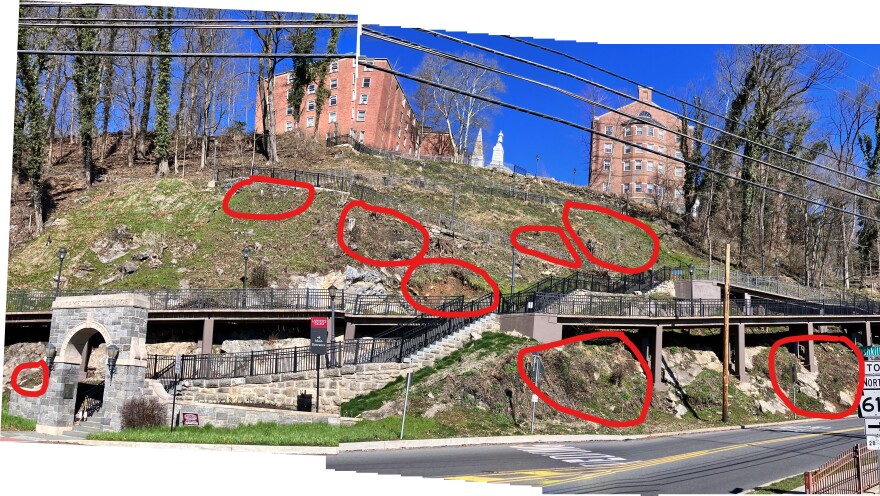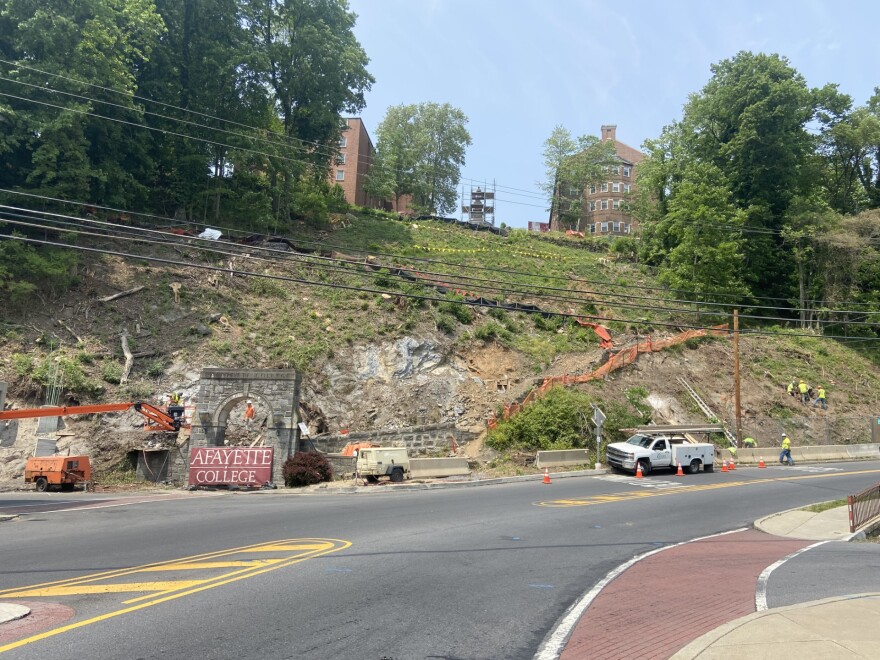EASTON, Pa. — A year after a piece of Lafayette's College Hill was deforested without city approval for a $1.2 million walkway project, city environmental officials are calling on the college to continue repairs.
“The city continues to receive public complaints on a weekly basis regarding the hillside, its desolate appearance and the active and obvious erosion that is occurring,” said city Conservation Manager Rob Christopher, and Ian Kindle, chair of the city’s Environmental Advisory Council, in a joint email sent Friday to college leaders associated with the project.
Lafayette is a leader in our community and has a large footprint within Easton, but the environmental results of this project do not currently portray the college as an organization that genuinely cares for Easton’s limited urban green spaces, complies with city ordinances, or considers the concerns of our residents.Rob Christopher, Easton's conservation manager, and Ian Kindle, chair of Easton's Environmental Advisory Council
“Lafayette is a leader in our community and has a large footprint within Easton, but the environmental results of this project do not currently portray the college as an organization that genuinely cares for Easton’s limited urban green spaces, complies with city ordinances, or considers the concerns of our residents,” the email said. “We hope through swift action you can remedy some of these negative impressions.”
Scott D. Morse, Lafayette College's assistant vice president for communications and marketing, said the college's work is not finished.
"We remain committed to the escarpment trail landscaping plans that were discussed in the fall," Morse said in an email. "Now that springtime is just around the corner, we look forward to following through and continuing to work closely with the city, particularly Rob Christopher.
"I can confirm that all bare soil on the hill was seeded in the fall, so the empty patches are either a product of the season or tricky areas that will require more attention. Also, per conversations with Mr. Christopher late last fall regarding the promotion of tree regrowth, our landscapers did not cut back trees to the stumps."
The deforestation of College Hill
Last spring, more than 40 trees, along with a slew of foliage and shrubs, were removed from College Hill facing North Third Street to make way for a public, multimodal trail.
In early May, the city’s Environmental Advisory Council voted unanimously to send a letter of concern to city council, citing the negative effects of clearing shade trees, as well as soil erosion and sedimentation concerns.
The original plans for the project, approved by the city on June 14, 2022, and viewed through a Right-to-Know request in late May, show the vast majority of the trees would be retained. Instead, they were cleared.
City Chief Zoning Administrator Dwayne Tillman on May 15 sent a letter to the college, notifying officials that the walkway project had deforested a portion of a slope without city approval, violating the city's steep slope ordinance.
Less than two weeks later, the college resubmitted plans that included planting 98 trees to replace 46 that were cut down during construction.
During a June meeting at city hall to review the resubmitted plans, Tillman was asked if the college gave any reasoning for why the trees were cut down without approval.
He said officials cited safety and maintenance concerns, as some trees were dying. However, since the trees have been cleared, it is impossible to confirm the health status of those trees.
And, because of the extreme pitch of the hillside, trees cannot be replaced.
Instead, the college planted 45 trees and 36 shrubs across the College Hill campus and in the city.
The walkway was earmarked to be completed by mid-August, less than two years after Lafayette announced it had received a $869,694 grant to create a multi-use trail extending diagonally across the slope.
The college committed $372,726 for a project total of $1.2 million, according to a news release announcing the funding.
‘Properly remedied’
Friday’s letter calls on college officials “to resume conversations with you about the next steps to be taken by Lafayette College to ensure the steep slope issues we discussed in the fall are still going to be addressed.
“While it is evident that some planting and stabilization has taken place, we do not consider all the issues to have been properly remedied,” the email said. “This is evident from the areas of subsidence that can be seen currently, and which are likely to become more problematic as time progresses.”
Attached to the email were photos taken this month showing how water has affected the slope. An area near the Bushkill Creek used for dam removal access “is also showing signs of excessive erosion and needs further mitigation.”

“These areas should likely see the highest priority for installing water diversion infrastructure as well as rehabilitative soil retention measures and plantings,” according to the email. “But these are not the sole areas of concern.”
There’s also large areas of bare soil, including below the path, in need of stabilization. Kindle and Christopher also recommended “deep rooted warm season grasses as well as shrubs and small tree species be included in replanting plans for the area.”
When native trees resprouted on the slope late last fall, advocates recommended leaving them to grow “so that they can be trained, promoting a strong structure.”
However, that hasn’t happened.
“This spring, we noticed most of those were cut back to the stumps, leaving only [one or two] sycamore stumps with their new growth intact,” according to the email. “This is counterproductive to the process of stabilizing the hillside and these actions lead us to believe the intention is to avoid visual obstructions rather than to prioritize the integrity and stability of the slope.”










